#donor community
Text
From "Meaningful participation" to "Intentional Women-Led Mediation". Insights from Intersecting Crises.
Building on the impetus from the Secretary General's New Agenda for Peace, the panel discussion will bring together the members of the Global Alliance of Regional Women Mediator Networks, representatives of Permanent Missions of the UN Member States and the donor community to facilitate an exchange of experiences among women mediators' networks in addressing intersecting crises, such as climate change, intensifying natural disasters, and the recent COVID pandemic.
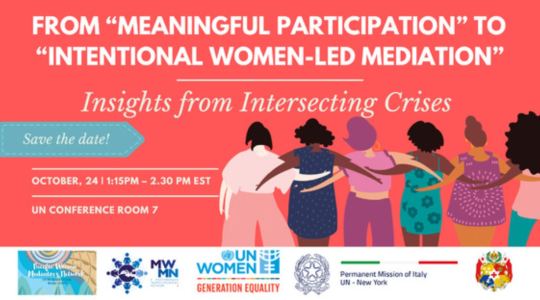
Based on shared experiences, participants will jointly explore evidence-based recommendations through which women-led mediation work can be intentionally and effectively supported in policy and practice using the opportunities presented by the annual UNSC Open Debate on WPS, the New Agenda for Peace, and the upcoming 2025 UN Peacebuilding Architecture Review (PBAR).
#Permanent Missions#member states#donor community#women mediators#panel discussions#New Agenda for Peace#Peacebuilding Architecture Review (PBAR)#women-led mediation
0 notes
Note
i wish i could explain how vampirism is Everything to me, including my gender, to people without sounding insane. like. you know the myth about how some people are just born destined to become vampires after death? it's like that. the little girl i used to be is dead and buried. i clawed my way out of her grave. i am forever changed. and yet. i was always meant to be this. do not stand at my grave and weep. i am not there. i do not sleep.
.
#christabelthevamp#sanguinarian#donor#vampir#vampire#vampire community#vampyre#psychic#vampirekin#hybrid#vampgender
80 notes
·
View notes
Text
I've posted many times before about how surrogacy exploits vulnerable women and turns their babies into commodities. This article is about the impact of the fertility industry on the children themselves.
‘I slept with my half-sibling’: Woman’s horror story reflects loosely regulated nature of US fertility industry
By Rob Kuznia, Allison Gordon, Nelli Black and Kyung Lah, CNN | Photographs by Laura Oliverio, CNN
Published 10:00 AM EST, Wed February 14, 2024CNN —
Victoria Hill never quite understood how she could be so different from her father – in looks and in temperament. The 39-year-old licensed clinical social worker from suburban Connecticut used to joke that perhaps she was the mailman’s child.
Her joke eventually became no laughing matter. Worried about a health issue, and puzzled because neither of her parents had suffered any of the symptoms, Hill purchased a DNA testing kit from 23andMe a few years ago and sent her DNA to the genomics company.
What should have been a routine quest to learn more about herself turned into a shocking revelation that she had many more siblings than just the brother she grew up with – the count now stands at 22. Some of them reached out to her and dropped more bombshells: Hill’s biological father was not the man she grew up with but a fertility doctor who had been helping her mother conceive using donated sperm. That doctor, Burton Caldwell, a sibling told her, had used his own sperm to inseminate her mother, allegedly without her consent.
But the most devastating revelation came this summer, when Hill found out that one of her newly discovered siblings had been her high school boyfriend – one she says she easily could have married.
“I was traumatized by this,” Hill told CNN in an exclusive interview. “Now I’m looking at pictures of people thinking, well, if he could be my sibling, anybody could be my sibling.”
Hill’s story appears to represent one of the most extreme cases to date of fertility fraud in which fertility doctors have misled their female patients and their families by secretly using their own sperm instead of that of a donor. It also illustrates how the huge groups of siblings made possible in part by a lack of regulation can lead to a worst-case scenario coming to pass: accidental incest.
In this sense, say advocates of new laws criminalizing fertility fraud, Hill’s story is historic.
“This was the first time where we’ve had a confirmed case of someone actually dating, someone being intimate with someone who was their half-sibling,” said Jody Madeira, a law professor at Indiana University and an expert on fertility fraud.
A CNN investigation into fertility fraud nationwide found that most states, including Connecticut, have no laws against it. Victims of this form of deception face long odds in getting any kind of recourse, and doctors who are accused of it have an enormous advantage in court, meaning they rarely face consequences and, in some cases, have continued practicing, according to documents and interviews with fertility experts, lawmakers and several people fathered by sperm donors.
CNN also found that Hill’s romantic relationship with her half-brother wasn’t the only case in which she or other people in her newly discovered sibling group interacted with someone in their community who turned out to be a sibling.
At a time when do-it-yourself DNA kits are turning donor-conceived children into online sleuths about their own origins – and when this subset of the American population has reached an estimated one million people – Hill’s situation is a sign of the times. She is part of a larger groundswell of donor-conceived people who in recent years have sought to expose practices in the fertility industry they say have caused them distress: huge sibling pods, unethical doctors, unreachable biological fathers, a lack of information about their biological family’s medical history.
The movement has been the main driver in getting about a dozen new state laws passed over the past four years. Still, the legal landscape is patchy, and the US fertility industry is often referred to by critics as the “Wild West” for its dearth of regulation relative to other western countries.
“Nail salons are more regulated than the fertility industry,” said Eve Wiley, who traced her origins to fertility fraud and is a prominent advocate for new laws.
Accountability in short supply
More than 30 doctors around the country have been caught or accused of covertly using their own sperm to impregnate their patients, CNN has confirmed; advocates say they know of at least 80.
Accountability for the deception has been in short supply. The near-absence of laws criminalizing the practice of fertility fraud until recently means no doctors have yet been criminally charged for the behavior. In 2019, Indiana became the second state, more than 20 years after California, to pass a statute making fertility fraud a felony.
Even in civil cases that have been settled out of court, the affected families have typically signed non-disclosure agreements, effectively shielding the doctors from public scrutiny.
Meanwhile, some doctors who have been found out were allowed to keep their medical licenses.
In Kentucky, retired fertility doctor Marvin YussmanMarvin Yussman admitted using his own sperm to inseminate about half a dozen patients who at the time were unaware that he was the donor. One of them filed a complaint to the state’s board of medical licensure when her daughter – who was born in 1976 – learned Yussman was the likely father after submitting her DNA to Ancestry.com.
“I feel betrayed that Dr. Yussman knowingly deceived me and my husband about the origin of the sperm he injected into my body,” the woman wrote in a letter to the board in 2019. “Although I realize Dr. Yussman did not break any laws as such, I certainly feel his actions were unconscionable and depraved.”
In his response to the medical board, Yussman said that during that era, fresh sperm was prioritized over frozen sperm, meaning donors had to arrive on a schedule.
“On very rare occasions when the donor did not show and no frozen specimen was available, I used my own sperm if I otherwise would have been an appropriate donor: appropriate blood type, race, physical characteristics,” Yussman wrote.
He added some of his biological children have “expressed gratitude for their existence” to him and even sent him photos of their own children. Yussman, who noted in his defense that he didn’t remember the woman who made the complaint, said his policy decades ago was to inform patients that physicians could be among the possible donors, though neither he nor the complainant could provide records that clarified the protocol.
The board declined to discipline him, citing insufficient evidence, according to case documents. Reached on the phone by CNN, Yussman declined to comment.
The story that really put fertility fraud on the national radar was that of Dr. Donald Cline, who fathered at least 90 children in Indiana. Cline’s case spurred lawmakers to pass legislation that outlawed fertility fraud but wasn’t retroactive, meaning he was never prosecuted for it. But he was convicted of obstruction of justice after lying to investigators in the state attorney general’s office who briefly looked into the case. Following that conviction in 2018, Cline surrendered his license. Cline’s lawyer did not respond to an email seeking comment.
Netflix followed up with a documentary about Cline in 2022 that inspired two members of Congress – Reps. Stephanie Bice, an Oklahoma Republican, and Mikie Sherrill, a New Jersey Democrat – to coauthor the first federal bill outlawing fertility fraud. If passed, the Protecting Families from Fertility Fraud Act would establish a new federal sexual-assault crime for knowingly misrepresenting the nature or source of DNA used in assisted reproductive procedures and other fertility treatments. The bill has found dozens of backers – 28 Republicans and 20 Democrats – amid a renewed effort to push it on Capitol Hill.
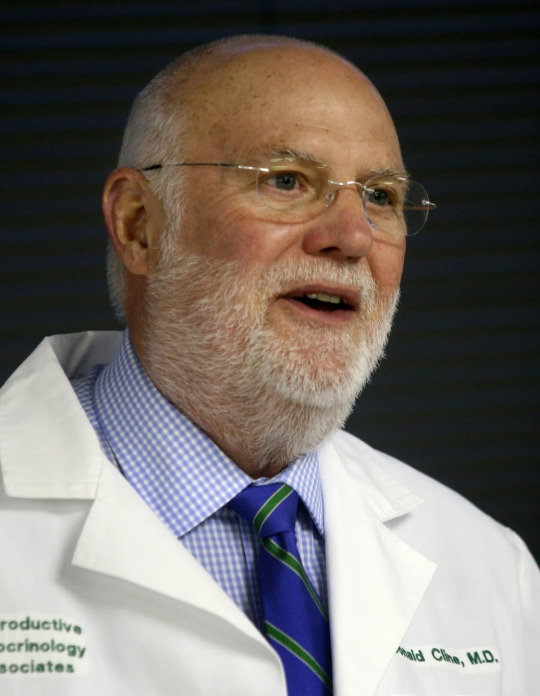
In this March 29, 2007 file photo, Dr. Donald Cline, a reproductive endocrinologist and fertility specialist, speaks at a news conference in Indianapolis.Kelly Wilkinson/The Indianapolis Star/AP/File
A group of advocates including Hill plans to go to DC to champion the bill on Wednesday.
To be sure, passage wouldn’t mean that any of the dozens of doctors who have already been accused of fertility fraud would go to prison, as the crime would have occurred before the law existed. But the measure would provide more pathways for civil litigation in such cases.
The push to better regulate the fertility industry isn’t without critics. It inspires unease – if not outright opposition – from some who fear any industry crackdown could have the unintended effect of making the formation of families less accessible to the LGBTQ community, which comprises an outsized share of the donor-recipient clientele.
“I think we should pause before creating additional criminal liability for people practicing reproductive medicine,” said Katherine L. Kraschel, assistant professor of law and health sciences at Northeastern University. “It gives me great pause … to say we want the government to try to step in and regulate what amounts to a reproductive choice.”
Some experts also point out that the advent of take-at-home DNA tests by companies such as 23andMe and Ancestry has pretty much stamped out fertility fraud in the modern era.
“To my knowledge, the majority of fertility fraud cases took place before 2000,” said Julia T. Woodward, a licensed clinical psychologist and associate professor in psychiatry and OBGYN in the Duke University Health System, in an email to CNN. “I think it is highly unlikely any person would engage in such practices today (it would be too easy to be exposed). So this part of the landscape has improved significantly.”
But activists in the donor-conceived community still want laws, in part to provide pathways for civil litigation, and also to send a message to any medical professional who might feel emboldened by the lack of accountability.
“Let’s say arguably that it doesn’t happen anymore,” said Laura High, a donor-conceived person and comedian who, with more than 600,000 followers on TikTok, has carved out something of a niche as a fertility-industry watchdog on social media. “Pass the f**king legislation just in case.
“Why not just out of the optics – just out of a, ‘Hey we’re going to stand by the victims.’ Let’s just do this. We know it’s never going to happen anymore, but let’s just make this illegal.”
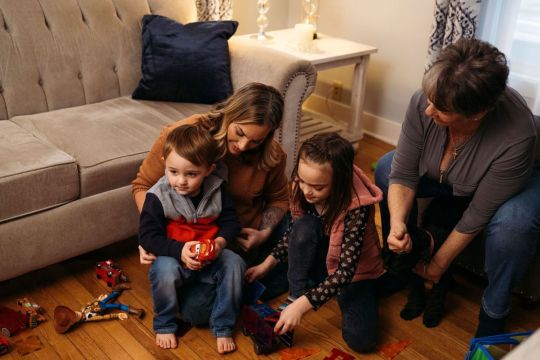
Victoria Hill and her two children play with toys in the living room of her mother's house in Wethersfield. Laura Oliverio/CNN
‘You are my sister’
The lack of a law in Connecticut appears to have been a stumbling block for a pair of siblings seeking recourse for what they allege is a case of fertility fraud.
The half-siblings – a sister and brother – sued OBGYN Narendra Tohan of New Britain in 2021, saying he deceived their mothers when using his own sperm in the fertility treatments.
He has derailed the suit with a novel defense, arguing successfully that it amounts to a “wrongful life” case, which typically pertains to people born with severe life-limiting conditions and isn’t recognized in Connecticut. Tohan, who is still practicing, did not return an email or call to his office seeking comment. The siblings are appealing the ruling.
Madeira, the expert in fertility fraud from Indiana University, called the “wrongful life” decision absurd.
“In fertility fraud, no parent is saying that – no parent is saying I would have gotten an abortion,” she said. “Every parent is saying, ‘I love my child. I just wish that my wishes would have been respected and my doctor wouldn’t have used his sperm.’”
And then there is Dr. Burton Caldwell, who declined CNN’s request for an interview. One of his apparent biological children decided to sue him last year, even though she knows it will be an uphill battle without a fertility fraud law on the books. Janine Pierson and her mother, Doreen Pierson, accuse Caldwell – who stopped practicing in the early 2000s – of impregnating Doreen with his own sperm after having falsely told her that the donor would be a Yale medical student.
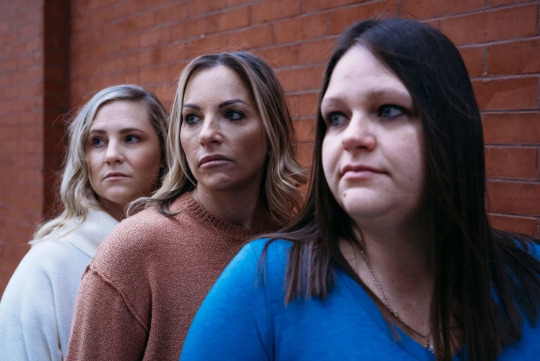
Half-sisters Alyssa Denniston, Victoria Hill and Janine Pierson pose for a portrait in Hartford, Connecticut. The three of them say they — and at least 20 others — all share a biological father, Dr. Burton Caldwell. Laura Oliverio/CNN
Janine Pierson, a social worker, thought she was an only child until she took a 23andMe test in the summer of 2022 and was floored to learn she had 19 siblings. (That number has since grown to 22.)
“It was like my entire life just came to this screeching halt,” she told CNN.
When she learned through one of her siblings that Caldwell was the likely father, Pierson said she immediately phoned her mom, who was stunned.
“We both just cried for a few minutes because it just felt like such a violation,” Pierson said.
Pierson said she decided to pursue the lawsuit even though she knows the lack of a fertility-fraud law in Connecticut could pose a challenge.
“It shouldn’t just be, you know, the Wild West where these doctors can just do whatever it is that they want,” she said.
Hill is watching her newly discovered half-sister’s case closely.
For her, the first surprise was learning the dad she grew up with wasn’t her biological father. Although her mom had told her when Hill was younger that she’d sought help conceiving at a fertility clinic, she also said – falsely – that the doctor had used her dad’s sperm.
When Hill learned that the biological father appeared to be Caldwell a few years ago, she contacted lawyers to inquire about filing a suit, but was told she doesn’t have much of a case, so she didn’t pursue it. Now, she said, her statute of limitations is about to expire.
Last year, Hill was hit with another shattering revelation.
In May, she and her three closest friends were celebrating their 20-year high school reunion over dinner.
She was sharing the tale with them of how she learned about her biological father. Everyone was captivated, except one person – her former boyfriend. He looked like he was turning something over in his head. Then he noted that his parents, too, had sought help conceiving from a fertility clinic.
A couple months later, in July, as Hill was leaving for a summer vacation with her husband and two young children, the ex-boyfriend texted her a screenshot showing their 23andMe connection.
“You are my sister,” he said.
Fertility industry regulations in US lax relative to other countries
Hill’s high school boyfriend isn’t the only person she knew in the community who turned out to be a sibling.
“I have slept with my half-sibling,” Hill said. “I went to elementary school with another.”
What’s more, Hill said, back in the early 2000s, she lived across the street from a deli in Norwalk she often went to that was owned by twins who she later learned are her siblings.
Pierson, too, discovered recently that she’d crossed paths with a sibling long ago. She said she has a group photo from when she was a kid at summer camp that shows her on a stage and a boy in the audience. In 2022, she learned that he is her older half-brother.
“Within 20 feet of one another, and we have no idea,” she said.
In general, the bigger the sibling pool, the greater the risk of accidental incest – regardless of whether fertility fraud came into play.
“I don’t date people my age. I can’t do it,” said Jamie LeRose, a 23-year-old singer from New Jersey who has at least 150 siblings from a regular sperm donor, not a doctor. “I look at people my age and I’m automatically unattracted to them because I just, I go, that could be my sibling.”
With this in mind, activists also often advocate for laws that cap the number of siblings per donor – and that do away with donor anonymity. (Neither of these restrictions are included in the proposed federal bill.)
Other countries have instituted such regulations. Norway for instance limits the number of children to eight; Germany, to 15. Germany and the UK have banished anonymity at sperm banks.
The United States government has no such requirements – and the professional association that represents the fertility industry wants to keep it that way.
“What we have not done very much in this country is pass regulations about who gets to have children,” said Sean Tipton, the chief advocacy and policy officer for the American Society for Reproductive Medicine. “If you’re going to say you should only be able to have 50 children, that’s fine. But that should apply to everybody. It shouldn’t apply just to sperm donors.”
Regarding the concern among donor-conceived people about accidental incest, Tipton added, “if you want to be sure that before you have children with somebody, you can run DNA tests to make sure you’re not related.”
The ASRM, which often clashes with donor-conceived activists, has not taken a stance on the federal bill, Tipton told CNN.
The organization does offer nonbinding guidelines that address concerns about incest, recommending for instance no more than 25 births per donor in a population of 800,000.
Although most of the donor-conceived people who spoke with CNN for this story said they wanted to see legislative change, they also described an emotional aspect of the topic that no new law or regulation could begin to quell: a yearning to better understand one’s origins and identity. For Pierson, it was this desire, coupled with a mix of anger and curiosity, that compelled her to pay Caldwell an unannounced visit one day in 2022 – weeks after she’d learned he was most likely her biological father.
Confronting Caldwell
“I woke up that day and I had decided I didn’t want to call him,” Pierson said. “I didn’t want to give him the opportunity to say no. So I just drove directly to his house from work.”
Pierson, who lived in Cheshire at the time, describes an experience that was equal parts surreal and awkward.
After an hourlong trip, she pulled up to a large, stately house with a long driveway not far from the Connecticut coast. When she knocked on the door, nobody answered. But when a neighbor stopped by to drop something off, Caldwell opened the door. Seizing the moment, Pierson introduced herself. He let her in.
Laying eyes for the first time on her biological father, Pierson, 36, saw a man in his 80s with a slight tremor due to Parkinson’s, sporting a blue golf shirt.
He invited her inside and they sat at his dining room table.
Caldwell, she said, didn’t seem surprised – likely because Hill had made a similar visit a couple of years earlier.
“He was not in any way apologetic,” Pierson said, but she added that he did not deny using his own sperm when working in the 1980s at a New Haven clinic. She said Caldwell confessed that he “never gave it the thought that he should have … that there would be so many (children), and that it would have any kind of an impact on us.”
Pierson said Caldwell asked her questions that gave her pause.
“One thing that really has always bothered me is that he asked me how many grandchildren he had,” she said. “And he was very curious about my scholastic achievements and what I made of myself. … Like how intelligent I was, basically.”
She said their conversation ended abruptly when, looking uncomfortable, Caldwell stood up, which she took as a signal that the visit was over. Before parting ways, she asked if he would pose for a photo with her. He consented.
“I knew it would be the only time that I actually ever had that opportunity to take a picture,” she said. “Not that I wanted like a relationship with him in any way because – it was just like mixed of emotions of, you know, like, I despise you, but at the same time, I’m grateful to be here.”
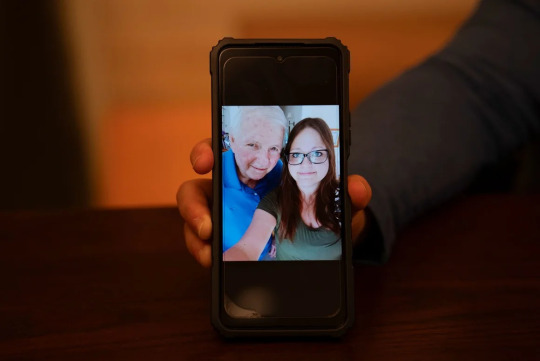
Janine Pierson displays a selfie she took with Caldwell on her phone in Hartford, Connecticut. Pierson took the photo during a visit with Caldwell in 2022 and it is the only photograph she has with him. Laura Oliverio/CNN
#usa#Fertility industry#Burton Caldwell#Fertility fraud#huge groups of siblings made possible in part by a lack of regulation#Accidental incest#Most states have no laws against fertility fraud#huge sibling pods#unethical doctors#unreachable biological fathers#a lack of information about their biological family’s medical history#Nail salons are more regulated than the fertility industry#At least 80 doctors have used their own sperm to impregnate their patients#Marvin Yussman#Dr. Donald Cline fathered at least 90 children#Protecting Families from Fertility Fraud Act still hasn't passed into law#wrongful life#OBGYN Narendra Tohan is still practicing#Large sibling pods in the same community#Norway limits the number of donor conceived children to eight#Germany limits donor conceived children to 15#Germany and the UK have banished anonymity at sperm banks
17 notes
·
View notes
Text
lmaoooo they’re interviewing the most incompetent bitch for the position they turned me down for girl.
#she’s prob gonna get it which is hysterical. gkr#girl#u turn me down bc ur like ‘well it just requires a lot of communication w/high level donors and writing’#but ur interviewing someone who cannot write a cohesive email….#vs the guy with a (glorified) english degree?#漫言
3 notes
·
View notes
Text
Motherfucker, guess who accidentally worked for free for a whole month and a half because neither my boss (who is genuinely a good stand-up guy) nor I realized that the department wrote the contract to end in mid-July when all of us (including the grant funder) thought that it would be across the whole summer until the end of August.
#the valley is posting#i'm not going to go after anyone for it because it was a legitimate mistake#but dammit; this is why i've been telling the union we need clearer communication between administration and workers#because both my boss and the grant donor agreed that the money would be across the whole summer#which is what i was told during the interview process; that it would be a job for the whole summer#but the university bureaucracy decided to write the contract for 2.5 months instead of four so that's how the grant got divvied up#i still got paid the amount that was agreed upon; just across 2.5 months instead of four#anyways; this is your reminder to read the fine print of your damn hiring contract folks
5 notes
·
View notes
Text
I think. I accidentally became The Spokesperson Of Autism to one of my taekwondo instructors
#I don’t mind teaching them stuff I just find it funny#I mentioned being pretty informed about This Sort Of Thing one (1) time#he mentioned the schools doing a charity thing for an autism charity (since quite a few students are autistic/neurodivergent)#and said that we could write donors’ names on multicolor puzzle pieces and hang them up#and I kinda mentioned ‘the autistic community as a whole isn’t a fan of the puzzle piece bc it’s linked to autism speaks and AS doesn’t#really have the community’s best interests at heart. almost no board members if any are actually autistic#and they support some messed up practices’#and he just asked me if I knew any charities that were popular within the autistic communities#anyway we��re planning on doing raised arms instead of puzzle pieces#and I recommended checking out ASAN#aegis talks to the void
11 notes
·
View notes
Note
I'm not sure what specifically it is but I like grey he seems lovely but I cannot STAND jack. I think just the constant writing making him this tragic hero in every scenario just really gets on my nerves and the way grey plays jack doesn't really help. I feel a bit bad as he seems like a really nice guy and I haven't heard anyone say anything bad about meeting him but the guy really needs some help improving on the acting side of things.
I have my issues with Grey and it bothers me that people who met him just turn a blind eye to all the harmful stuff he's implied with his support and wording when discussing the donor storyline so I'm not going to be one of those that just excuses it like most of this fandom and especially the ones who met him just because he's 'so nice and handsome'. As for Jack, I don't like him at all either. He's a boring straight white man who they continuously have playing the victim and hero who does stupid stuff constantly. He's never been appealing to me and especially in the recent seasons.
#asks#anon#this is probably a little too honest but oh well#i don't expect a straight white man to understand the harmful dialogue or implications the donor storyline had on the community#but he should at least know better than to refer to marina's baby as 'our baby' implying it would jack's also if using his sperm#so yeah i'm not into all that at all
4 notes
·
View notes
Text
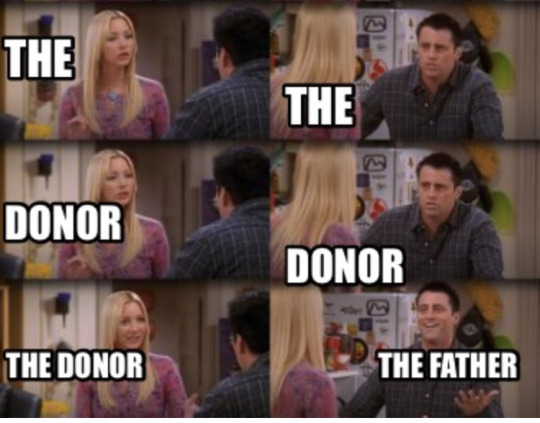
Tomorrow’s post, “Donor Not Daddy,” is all about deciding what to call your donor and making sure your family and friends use the same term!
Check out my earlier posts:
#lesbian#lesbian life#lesbian love#lgbtqa#lgbtq community#lgbtq#lgbtq parents#lgbtlove#lgbtpride#lgbtq parenting#lgbtqipa#wlw love#sperm donor#donor conceived
4 notes
·
View notes
Text
107 days till top surgery pre-op appointment:
I am really considering becoming an egg donor, which will help cover the cost of my surgery in case my insurance doesn't. I'm looking into it and who knows, maybe I'll be chosen soon enough that I'll be able to get it before my surgery???
4 notes
·
View notes
Note
i see a lot of people recommending fruit juices for red things to drink, but i never see anyone recommending red berry tea (or basically any tea with hibiscus in it). it's warm, it's red, it's naturally sweet and a little tart - what's not to love? more vampires should drink tea!!
.
29 notes
·
View notes
Text
This isn't just regular fraud where someone is out money. This is about creating a individual person and how this will impact them later in life.
Imagine you found out when you were a teen that your father was not your biological father. That is what happened to both of our guests on this episode of Audacious.
One woman, Eve, then found out that her biological father was not the sperm donor her parents chose, but their fertility doctor. This is called “fertility fraud“. It is only illegal in 12 states (not including Connecticut), and not at all illegal on the federal level.
Another woman, Laura, developed health issues that were inherited. After finding half-siblings who were also struggling with similar issues, she asked her donor to disclose his medical records. He has refused. And there are no laws forcing him to comply.
Laura and Eve are now advocating for legal protections and changes to regulations in the fertility industry.
Find support groups for people navigating donor conception at Donor Conceived Community.
GUESTS:
Laura High: A New York-based comedian who is trying to get medical records from her biological father after developing a benign brain tumor and hormonal disorders
Eve Wiley: After finding out that her biological father was not the donor her parents chose, but their fertility doctor, Dr. Kim McMorries. She was part of the advocacy effort that led to Texas making fertility fraud a felony with punishment of between six months and two years in jail and a fine of up to $10,000
Khaleel Rahman, Jessica Severin de Martinez, Meg Fitzgerald, Meg Dalton, Carol Chen, Stacey Addo, and Catie Talarski contributed to this show.
Audacious with Chion Wolf is available as a podcast on Apple Podcasts, Spotify, Google Podcasts, Amazon Music, Tune In, Listen Notes, or wherever you get your podcasts. Subscribe and never miss an episode.
The interview lasts 49 minutes but it is very insightful
#Fertility fraud#Audacious#There is no federal law concerning fertility fraud#Fertility fraud is only illegal in twelve states#The Donor Conceived Community
15 notes
·
View notes
Text
God some people are so iffy. I'm glad you have the time to get stuck up about moral annoyances but some people don't have that luxury
#the luxury being a working moral compass or understanding of social morality#do you know how many times I've had to question my own humanity because I can't understand things other people call wrong or immoral#even my bloody parents called me cold-blooded and not human and a monster#which coming from them would be like the ocean calling a puddle wet#so as a result I got a serious case of morality ocd that convinced me I'm a horrible monster whenever I disagree with someone about morals#and then I had to come up with my own moral compass since my one was clearly not working and the people around me were abusive arses#which then led me to the question of: 'what makes something immoral?'#google's definition is 'a person or behavior that conscientiously goes against accepted morals'#which was a problem since I couldn't understand accepted morals#so I had to come up with my own definition of something that is immoral#which ended up being 'an action that actively or by proxy brings about harm to others'#and if it were a choice between two harmful things then choose one that does the least harm#and if they're equally harmful then choose the one that you like the most#and anything else I personally dislike is classified as a 'moral annoyance'#an example of a moral annoyance would be cannibalism#do I like cannibalism and would ever do it? no#but if a person were to go around eating discarded donor organs then I probably wouldn't care#I mean#no one died and the person who had that organ clearly doesn't need it anymore and it was discarded anyway#onto a less extreme example would be the problem of label infighting in the queer community#a moral annoyance nonetheless
2 notes
·
View notes
Link
Thank you to patron (and artist!) Cristy Corso for the donation!
Happy and healthy holidays, everyone! Consider making a year-end gift to Artists on the Lam at here. As always, I am so grateful for all of you.
#gratitude#patronage#donor#donors#thankful#art#artist#artists#artists on tumblr#community#midwest#curator#contemporary art#fine art#gallery#patron#happy holidays#grateful#aapi#woc
2 notes
·
View notes
Text
Too many cooks spoil the chili - or your next appeal
Too many cooks spoil the chili – or your next appeal
Or why too many cooks who don’t know what’s already in the pot can make a mess.
Years ago, my family was gathered at my parent’s home to celebrate Christmas. By then, we were a big crowd – I have three siblings, and each of us has two children.
So my mom planned to make eating easy: simple, hearty stuff we could help ourselves to as we wished.
That included a big pot of chili.
Now, my mom’s…
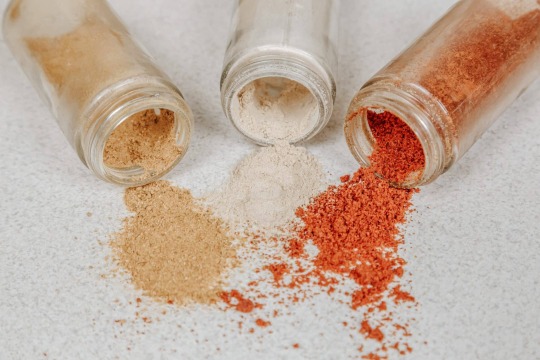
View On WordPress
2 notes
·
View notes
Text
A series of events that brought together key players in journalism and freedom of expression in Latin America and the Caribbean.

On 2 and 3 April 2024, San José, Costa Rica, emerged as the focal point of a series of events that brought together key players in journalism and freedom of expression in Latin America and the Caribbean.
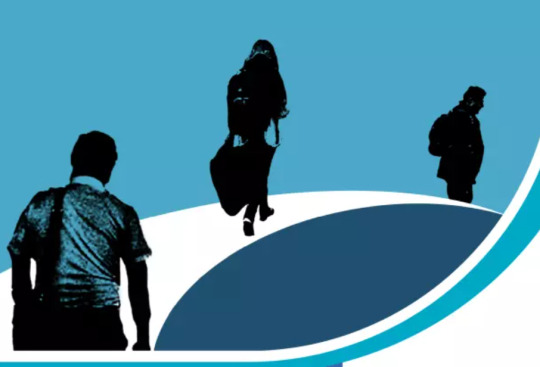
Within the project "Supporting Media Spaces for Displaced Journalists" framework, launched by UNESCO's International Programme for the Development of Communication (IPDC), various activities were conducted to address the growing challenges displaced journalists and media professionals face in the region.
The prevalence of violence against journalists has reached critical levels in Latin America and the Caribbean, with numerous cases of murder, harassment, and threats directly impacting freedom of expression and journalistic practice. According to UNESCO Observatory reports, between 2021 and 2023, 75 journalists lost their lives in the region. This violence, along with harassment and persecution, forces journalists to flee their homes and seek safety in neighbouring countries.
In this scenario, the UNESCO/IPDC project was launched to identify and articulate responses for the protection of displaced journalists, empowering them to continue with their journalistic work.
At the coordination meeting held on 2 April at the Inter-American Court of Human Rights Hearing Room, several issues were addressed from a multi-stakeholder perspective, fostering synergies among those engaged in addressing the plight of displaced journalists. From the presentation of the IPDC project's outcomes and findings to deliberations on future strategies to enhance and broaden initiatives supporting displaced journalists, the event provided a platform for reflection, dialogue, and proactive measures.
Distinguished speakers, including Judge Nancy Hernández López, President of the Inter-American Court of Human Rights, representatives from international cooperation, UN agencies, civil society organisations, media associations, journalists' unions, and academia, shared their perspectives and pledges to address this issue in the short and medium term.
Ambassador Raul Fernández Daza, President of the Intergovernmental Council of the International Programme for the Development of Communication (IPDC), underscored the international community's efforts to endorse projects that strengthen free, independent, and secure journalism in the region.
Roberto Rock, President of the Inter-American Press Association, emphasised that "for the IAPA, defending and supporting journalists in exile is an unavoidable priority, as their work is essential to upholding freedom of expression."
Synergies for action
Collaboration ties were strengthened throughout the day, and specific commitments were established to further advocate for initiatives to improve the safety and well-being of displaced journalists in the region.
Moderated by Rosa González, UNESCO's Regional Communication and Information Adviser for Latin America and the Caribbean, the coordination meeting addressed the following concrete initiatives:
Developing comprehensive support programmes for displaced journalists in Latin America and the Caribbean (UNESCO, multi-stakeholder).
Psychosocial support for displaced journalists: Launch of the Working Group on Comprehensive Safety and Resilience of Displaced Journalists (UNESCO).
Consultation process regarding displaced journalists by the Special Rapporteurship on Freedom of Expression of the Inter-American Commission on Human Rights (IACHR)
Creating spaces for freedom in San José, Costa Rica (DW and IPLEX).
Establishing an Inter-American network to comprehensively support displaced journalists and media (IAPA's Exile Journalism Subcommittee).
Progressing towards a regional press accreditation for displaced journalists (FEPALC)
Promoting a Model Law on the Safety of Journalists (SOCOLAC)
Guidelines on legal measures for resettlement in Costa Rica, Mexico and the United States (Institute of War and Peace Reporting)
Researching displaced journalists in Latin America and the Caribbean (University of Costa Rica, Heinrich Böll Foundation)
Providing legal support to displaced journalists (University for Peace)
A panel discussion led by the Inter-American Press Association
One of the most relevant segments of the programme was the dialogue session with journalists who have experienced displacement, facilitated by the Inter-American Press Association (IAPA). During this session, attendees heard firsthand testimonies from professionals conducting their journalistic work outside their home countries.
Moderated by Roberto Rock, President of the Inter-American Press Association (IAPA), the event brought together prominent journalists from the region who have been forced to work in exile.
"Ceasing journalism in exile would exacerbate an already existing abuse," declared a prominent journalist. "To prevent news deserts in certain regions, we must explore sustainable models to support nomadic media and address the precariousness and informality of journalism in exile," he further emphasised.
"The distance from the story is very challenging," stressed one journalist. "Media organisations must be ready to support their journalists in exile and ensure they are not left alone in a foreign country”.
“Adequate preparation is essential for coping with the long-term nature of the situation," added another professional.
"Silences have consequences, sometimes understandable but always unacceptable... The media that persist in exile will become the pioneering voices of the emerging democracies," emphasised a journalist who has experienced displacement.
Training workshops
The coordination meeting and discussion were followed by training workshops tailored for displaced journalists in the identified priority areas: legal, psychological, media sustainability, and safety support.
Working towards a one-stop shop for journalists in forced displacement situations.
One of the project's recommendations is establishing a platform for coordinating support mechanisms for displaced journalists, utilizing a multi-stakeholder and coalition-based approach. This involves donor countries, UN agencies, civil society organisations, academic institutions, media organisations, and journalists' associations.
"UNESCO aims to facilitate the coordination of next steps with key actors to enhance and broaden assistance efforts for displaced journalists and media professionals. This includes supporting the establishment of a virtual space where assistance efforts can converge into a one-stop shop," stated Alexander Leicht, Director of the UNESCO San José Regional Office.
#media sustainability#safety support#psychological support#displaced journalists#Training workshops#UNESCO San José#coalition-based approach#multi-stakeholder#journalists' associations#media organizations#donor countries#civil society organizations#academic institutions#Inter-American Press Association#International Programme for the Development of Communication (IPDC)#Inter-American Court of Human Rights
0 notes
Text
A Beacon of Hope: How a Chat Room Helped Destiny-Rae, 5, Find a New Kidney in the UK
Introduction:
Destiny-Rae, a bright and resilient 5-year-old girl, faced a daunting challenge when she was diagnosed with kidney failure. Her journey to find a life-saving kidney transplant seemed uncertain until a remarkable turn of events unfolded through the power of social media and online communities. In this heartwarming blog, we explore how Destiny-Rae’s story of hope and perseverance…

View On WordPress
#1. Destiny-Rae#10. Hope and perseverance#11. Pediatric healthcare#12. Living donor transplant#13. Compassion and generosity#14. Health awareness#15. Pediatric patient advocacy#16. Medical advancements#17. Organ transplant success#18. Community support#19. Life-changing surgery#2. Kidney transplant#20. Digital solidarity#21. Pediatric organ donation#22. Kidney disease awareness#23. Family resilience#24. Organ donor registration#25. Pediatric healthcare advocacy.#3. Organ donation#4. UK healthcare#5. Pediatric nephrology#6. Organ donor advocacy#7. Online communities#8. Social media impact#9. Medical miracles
0 notes